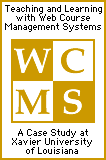Teaching and Learning with Web Course Management Systems

Promoting Learning and Community:
Using eCollege in an Introductory World Civilizations Course
Elizabeth Jones Hemenway (History)
During the Fall 2000 semester I began using eCollege in my honors World Civilizations class, a core curriculum course composed primarily of first-year students. This project was carried out in conjunction with a Louisiana Board of Regents technology grant that made possible the use of a laptop computer and InFocus portable projector in the classroom. I selected eCollege because it had a number of attractive features, including journals and a self-designed structure. It is also compatible with Microsoft Office products, so that uploading documents is a relatively easy process. I did not use all the site features but concentrated on a few. The site was also the primary location for posting assignments, so that students had to check the site on a regular basis.
In adopting eCollege I sought to provide additional ways for students to engage with the course material and demonstrate their comprehension and mastery. Students used the course website to share their findings and insights with other members of the class through threaded discussions and the webliography, and confidentially with me in their journals. The system constituted just one part of the class experience, as students worked together in groups throughout the semester in discussions, projects, and presentations. Each group of three to four students presented a topic to the entire class during each of the four course modules. Because of our information technology resources in the classroom, they incorporated interactive websites, PowerPoint, and graphics into their presentations. In effect, these students taught one another. As one student commented in her journal, "The format of the class has allowed the students to teach each other more than that of other classes. Learning has been more direct and centered on the perspectives of peers. I have appreciated and learned from this."
We did have some glitches with the system, which students remarked on in their end-of-semester questionnaires. Initially, a few students had difficulty logging on to the system. A small minority was quite resistant to using eCollege and did not keep up with assignments. The biggest obstacle was the inaccessibility of eCollege due to problems with the university server. At times, students gave up on an assignment in frustration rather than trying to overcome the technical difficulties.
Probably the strongest testimony to the success of the course and of eCollege came from student journals and the evaluations they submitted to me at the end of the semester. Overall, most students reported that the course was a positive experience; eleven of seventeen students registered to take the second half of the course with me in the Spring 2001 semester. Several commented that they had learned a great deal, had begun to enjoy history, and had gained confidence in their own abilities.
For example, in the beginning of the semester I didn't like to speak even if I had something intelligent to add to the discussion, for fear of being wrong. Now, especially as of late I feel that I have become more comfortable in speaking in the class which can be attributed to the group presentations and on-line discussions. I now find it easy to say in class what I put in the computer. I felt that I was good at presentations before college, but in high school I was presenting to people I had known for years. Now I can present to people I hardly know with ease and captivate their interest with interesting and intelligent work.
One outcome that I had not consciously planned was that through the participation in group discussions and presentations, these first-year students formed their own learning communities where they worked together not only for my course, but to study for other courses as well. The course, therefore, helped to foster an intellectual and academic community among students who might otherwise have felt isolated and insecure during their first semester of college.
<-- Prev. Section | Next Section -->
WCMS: Home | Executive Summary | Final Report | Narratives and Data | Findings | RealVideo Tour | Webliography
![[Xavier Seal]](/images/xavier-seal.png)
![[CAT+FD Logo]](/images/cat-site-icon.png)